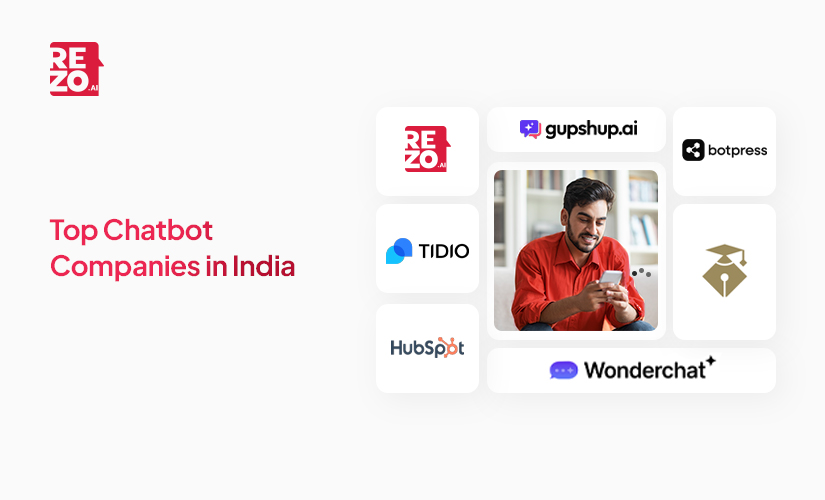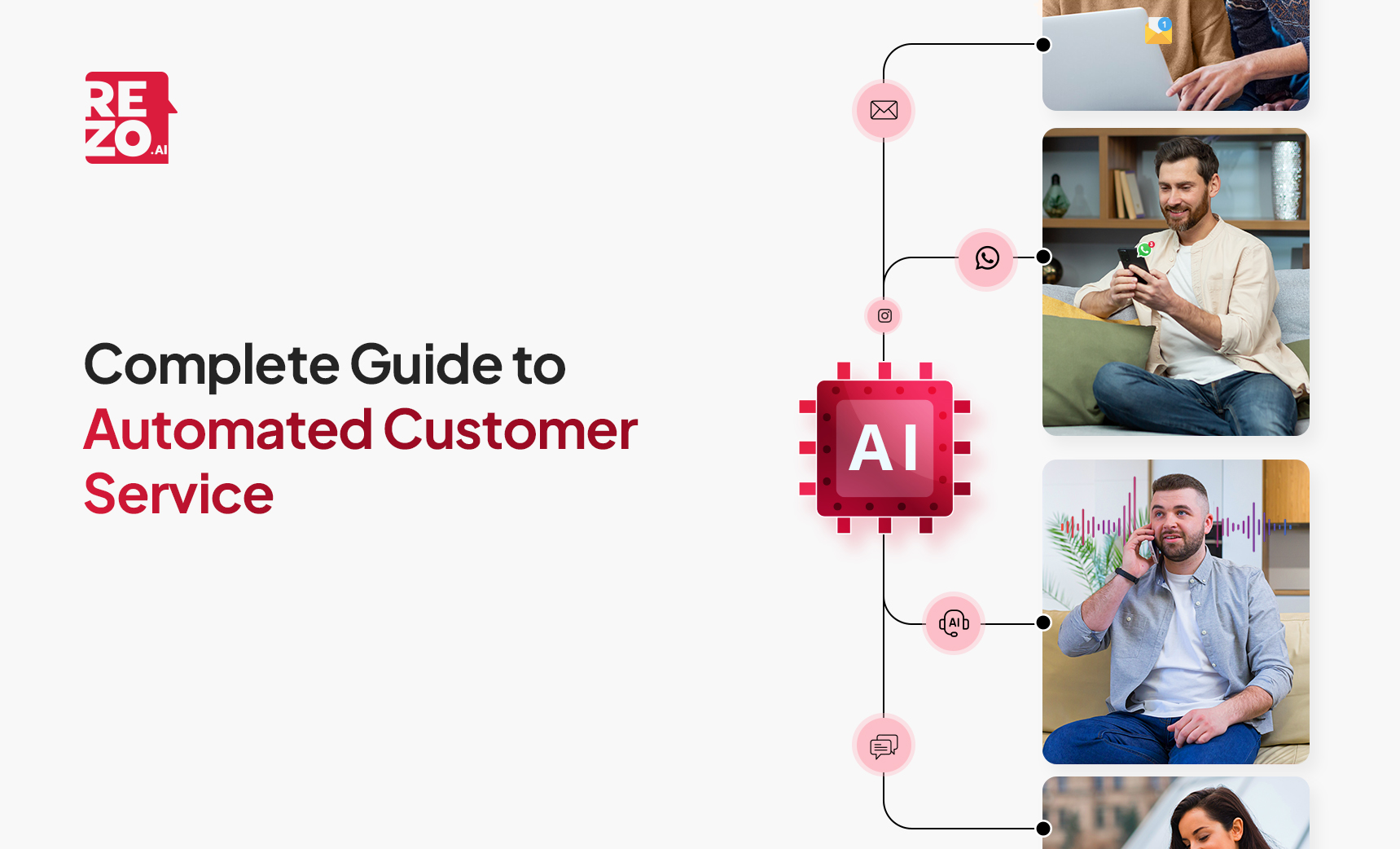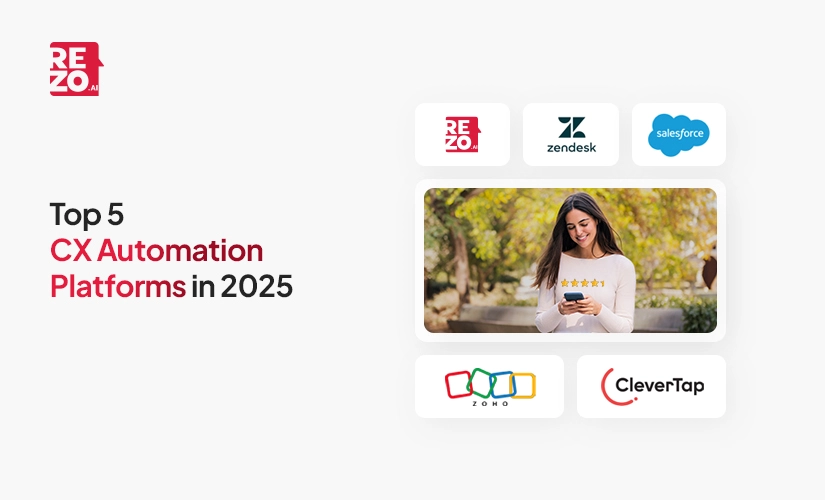
Top 5 CX Automation Platforms in 2025
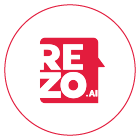
Top 5 CX Automation Platforms in 2025


Customer experience has evolved from being a competitive advantage to a business imperative. In today's digital-first landscape, customers expect instant, personalized, and seamless interactions across every touchpoint. This is where customer experience automation platforms come into play, revolutionizing how businesses engage with their customers at scale.
What is a Customer Experience Automation (CXA) Platform and its Benefits?
CX automation platforms leverage artificial intelligence, machine learning, natural language processing, and advanced AI-powered analytics to streamline and optimize the customer experience. These platforms improve customer satisfaction by delivering instant support, resolving queries efficiently, and creating personalized customer profiles. The result is improved operational efficiency, reduced response times, and a superior overall customer experience.
What are the Benefits of CX Automation Platform?
- Improved Efficiency:- CX automation platforms can handle routine tasks such as appointment scheduling, feedback collection, and basic query resolution. By offloading these repetitive processes, human agents can focus on more complex and high-value interactions, resulting in greater overall efficiency.
- 24/7 Availability:- AI-powered chatbots and voice bots enable continuous, round-the-clock customer support. This ensures uninterrupted service and faster response times, thus meeting and exceeding customer expectations.
- Proactive Support:- AI agents go beyond reactive service by leveraging predictive analytics to anticipate customer needs. They can identify potential next steps, follow-up queries, or issues before they arise, and provide timely recommendations or solutions.
- Scalability:- AI-driven automation allows enterprises to easily scale operations to meet increasing customer demand without proportionally expanding human resources. This makes it easier to manage peak volumes efficiently and cost-effectively.
- Valuable Insights:- AI systems generate valuable insights from customer interactions and behavior data. These insights help brands better understand customer preferences, optimize engagement strategies, and design personalized marketing campaigns that drive loyalty and retention.
.webp)
What are the Leading CX Automation Platforms?
With the integration of Agentic AI, CX Automation Platforms are becoming an integral part of customer journey, taking up a major chunk of the workload for contact centers. Let us dive into the leading CX Automation platforms:-
1. Rezo AI
Rezo AI is a customer experience automation platform that bridges the gap between enterprises and their customers through its advanced Agentic AI technology. The platform offers Voice AI agents and chatbots that deliver a unified, hyper-personalized, and seamless customer experience. With multilingual capabilities supporting over 15 languages, Rezo AI is designed for global enterprises serving diverse customer bases. Its omnichannel architecture, powered by a centralized data repository, ensures context-aware, human-like interactions across every communication channel.
Additionally its AI powered quality assurance helps analyse customer interactions and provide data points and help analyse customer issues and pain points. Additionally it also provides Agent Analysis focusing on individual performance of agents, and where they need improvement.
Rezo AI also assists human agents, assisting them with customer inquiries by providing accurate real time data, provide next steps based on customer feedback.
.webp)
2. Salesforce
Salesforce is a leading player in the customer experience space, powered by its Customer 360 platform that connects all departments across an organization, including sales, service, and marketing. This unified view of customer data creates a centralized database accessible to all teams, enabling consistent, personalized, and context-rich interactions.
The platform also features automated customer feedback management through Customer Experience Intelligence (CXI), which leverages AI and data analytics to assess customer sentiment across every interaction. Additionally, its intelligent omnichannel provides better service by routing ensures that customer cases are automatically assigned to the most qualified human agents based on their skills, driving faster resolution and superior service quality.
3. Zoho
Zoho is an all-round customer experience management platform providing CRM, email marketing automation to clients, visitor tracking, social media automation tools, automated customer surveys, help desks and other automated processes. This unified approach provides for a siloed customer journey.
Zoho's platform helps in customer experience automation by automating entire customer journey and helping human agents and support teams to manage customer requests and improve customer satisfaction.
4. CleverTap
CleverTap focuses on enhancing customer lifetime value (CLTV) and brand loyalty through personalized, data-driven engagement. Powered by TesseractDB, the platform manages and analyzes customer data from multiple sources, delivering real-time insights to strengthen customer engagement. CleverTap’s advanced analytics capabilities enable businesses to ingest, segment, and optimize customer data for real-time testing, personalized experiences, and orchestrated omnichannel campaigns.
CleverAI, CleverTap’s proprietary AI engine, provides actionable insights and predictive analysis to help brands design more effective customer journeys. Additionally, CleverTap Promos automates customer rewards and loyalty programs, triggering personalized offers and incentives based on real-time customer behavior, driving deeper engagement and long-term brand loyalty.
5. Zendesk
Zendesk offers a unified ticketing system that consolidates all customer communications across email, phone, social media, chat, and other channels. This centralized approach provides support agents with complete context and customer data, enabling faster issue resolution and more personalized interactions. The platform also includes self-service tools that enhance agent productivity and improve overall operational efficiency.
Zendesk’s AI capabilities, powered by Model Context Protocol (MCP) and large language models (LLMs), automate routine tasks and manage customer queries with precision. This not only elevates the customer experience but also significantly reduces operational costs.
What Factors to Consider When Choosing Customer Experience Automation (CXA) Platforms?
When choosing Customer Experience automation platform, CX leaders should focus on certain factors like business objective, technical requirements, budget and long-term strategy.
Strategic Considerations:-
Define you goals:-
Before embarking on any automation initiative, it’s crucial to define your end goal. Are you aiming to automate basic customer support functions or the entire customer lifecycle? Automation can be seamlessly integrated across every stage of the customer journey, from enhancing customer communications to driving targeted customer retention campaigns and delivering personalized communications at scale.
Understand Your Customer Journey:-
Analyze customer behavior and customer interactions across the entire customer journey. There are multiple touchpoints such as problem awareness, brand discovery, and purchase intent. By automating any or all of these stages, organizations can drive operational efficiency, improve responsiveness, and significantly enhance customer satisfaction.
Asses your communication channels:-
Customers use multiple channels to communicate and seek support. It is essential to identify and analyze which channels they prefer, and implement automation tools accordingly. For instance, if most customer interactions happen over calls, deploying voice AI agents can effectively handle customer queries. Conversely, if engagement is higher on social media, conversational AI-powered chatbots are more suitable to deliver timely and consistent responses.
Platform Capabilities:-
Some features that CX leaders should look out for:-
- Omnichannel Customer Experience:- The platform should enable true omnichannel support for customer engagement by unifying customer data and ensuring a seamless experience across all communication channels. This allows customers to transition effortlessly between channels while maintaining context and continuity.
- Easy Integration:- Choose platforms that can integrate seamlessly with existing legacy systems such as Customer Relationship Management (CRM) system, marketing automation tools, and analytics tools. This ensures smoother deployment, faster adoption, and minimal disruption to ongoing operations.
- Hyper-personalization:- Today’s customers expect personalized communications and context-aware interactions. AI technologies that can understand intent and respond accurately help deliver this level of personalization. Multi-lingual chatbots and voice bots further enhance accessibility and increase customer satisfaction.
- Autonomous Operations:- CX leaders should prioritize automation solutions that operate with minimal human intervention. These systems should be capable of handling repetitive tasks such as responding to FAQs, analyzing customer data, and conducting automated customer surveys, allowing human agents to focus on more complex and value-driven interactions.
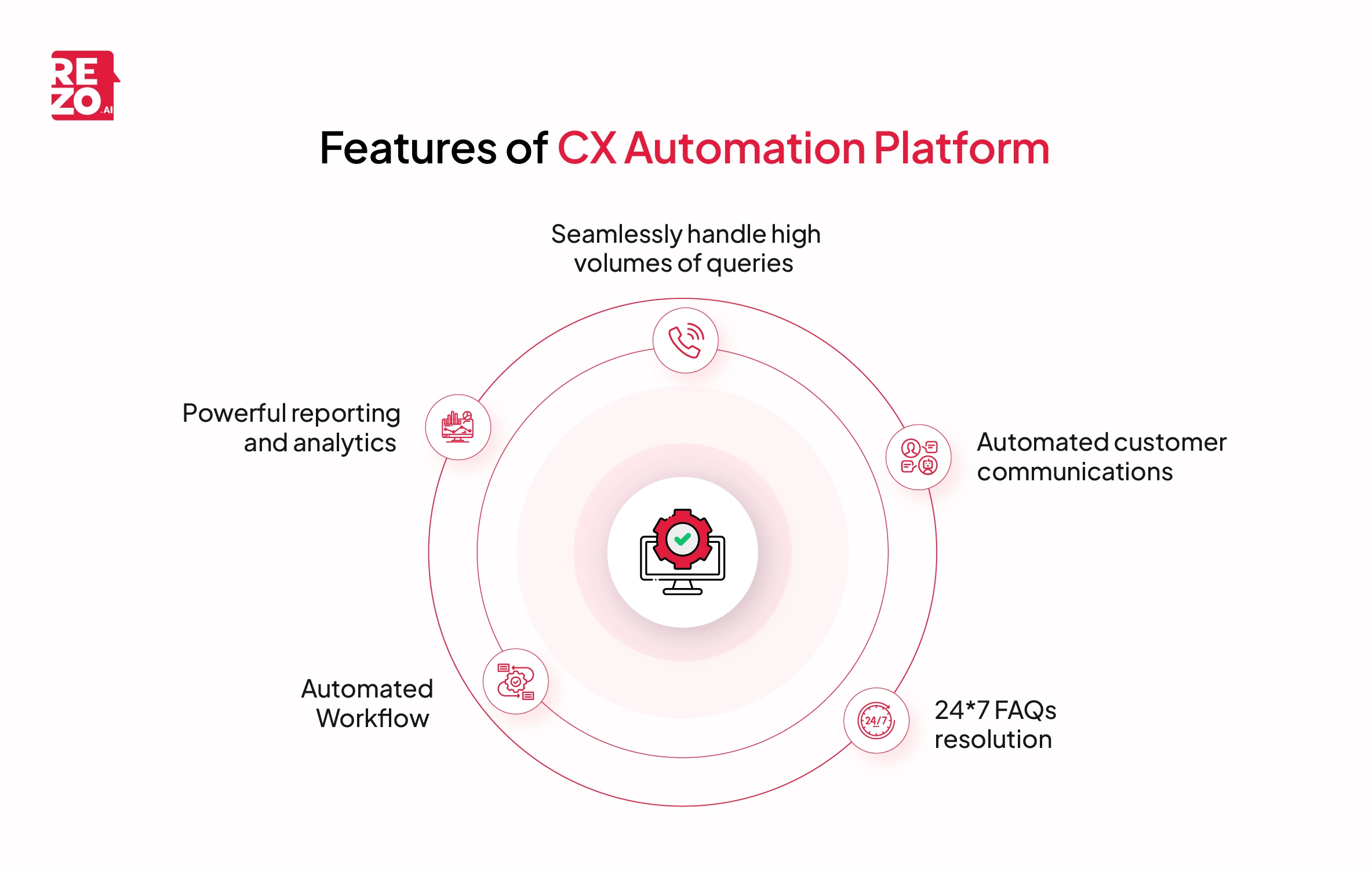
The Future of Customer Experience
In conclusion, customer experience today extends far beyond resolving customer queries. It has evolved into a strategic differentiator that directly influences customer loyalty, retention, and overall brand perception. As competition continues to intensify across industries, AI adoption has become a critical enabler for organizations aiming to stay relevant and competitive.
CX automation platforms are now emerging as essential business tools that empower enterprises to deliver seamless, personalized, and efficient customer interactions. By leveraging intelligent automation, businesses can reduce response times, improve operational efficiency, and create consistent, human-like engagement across all customer touchpoints.
According to a PwC report, 59 percent of consumers stop engaging with a brand after a poor customer experience. This highlights the urgent need for enterprises to invest in advanced CX automation. The real question for CX leaders is not whether to adopt these solutions, but how quickly and effectively their organizations can implement them to deliver exceptional, focused, and lasting customer experiences that drive growth and loyalty.
Frequently Asked Questions
What is a CX Platform?
A CX platform streamlines customer interactions across all channels providing a unified and centralised experience, that helps brands provide better customer support and in turn enhance customer engagement.
Is CX part of CRM?
Customer Experience (CX) is not a subset of Customer Relationship Management (CRM). While CRM primarily focuses on managing customer data and interactions, CX encompasses the entire customer lifecycle, emphasizing the overall experience and satisfaction at every touchpoint.
CRM serves as one of the foundational tools that support CX initiatives by enabling businesses to build stronger relationships, gain valuable insights, and ultimately enhance the quality of customer interactions.
What are the different types of customer support?
The different types of customer support include AI powered support, Omnichannel support, Live Chat support, Proactive support, Phone support, Social Media support, etc.
Frequently Asked Questions (FAQs)

Take the leap towards innovation with Rezo.ai
Get started now







